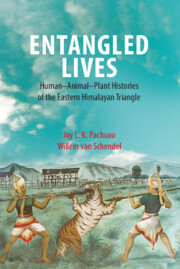6 - Human–Animal Histories
Published online by Cambridge University Press: 15 June 2022
Summary
In Chapter 5 we noticed that stories of human origins are full of references to a time when animals and humans could talk to each other, marry and have children together. In this chapter we focus on how people in the Triangle have understood animals to have contributed to human lifeworlds in more recent times. Close, long-lasting relationships with animals characterise most groups in the Triangle, not only in practical, instrumental terms but also in symbolic and emotional terms. These relationships have not been static; new meanings have been brought into them over time. In this chapter we consider how people imagined themselves to have family connections with certain animals, how they managed their fear of animals, how they distinguished between wild and domestic animals, and how they regulated hunting and sacrificing practices.
For humans around the world, animals have always been ‘an essential part of our history, culture and existence’. Ever since the appearance of modern humans, we have lived in close proximity to animals and have shared our lifeworlds with them. It is a relationship that is ‘complex, intimate, reciprocal, personal’ and, most importantly, ‘crucially ambivalent’.
Simplistic notions of so-called primitive societies being closer to, or one with, nature do not hold (Chapter 8). All societies – hunter-gathering, pastoral, agricultural and industrial – have associations with animals, but these vary. Moreover, such societal relationships cannot be reduced to a single metaphor because individual and social attitudes are diverse and complex. It is important not to romanticise the relationship between humans and nature in the case of societies that were technologically less sophisticated. In the Triangle, traditions such as the sacred grove, or hunting rituals, have often been read as showing a profound spiritual union with nature. Humans in the Triangle did appear to be motivated by an understanding that their lifeworlds were entangled with those of all other living beings, but they also distinguished between themselves and non-humans. What counted most for them was the absolute necessity to sustain relations of reciprocity with animals, plants and spirits. This endeavour pervaded their lifeworlds and religious imaginations. Taking proper care of human–non-human entanglements was a daily concern, but it did not hamper their construction of convenient niches for themselves. It is often assumed that colonial rule, Christianity and modernity destroyed what had been a pristine, sacred union, but this assumption needs to be carefully investigated.
- Type
- Chapter
- Information
- Entangled LivesHuman-Animal-Plant Histories of the Eastern Himalayan Triangle, pp. 91 - 126Publisher: Cambridge University PressPrint publication year: 2022



